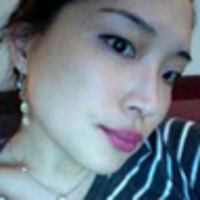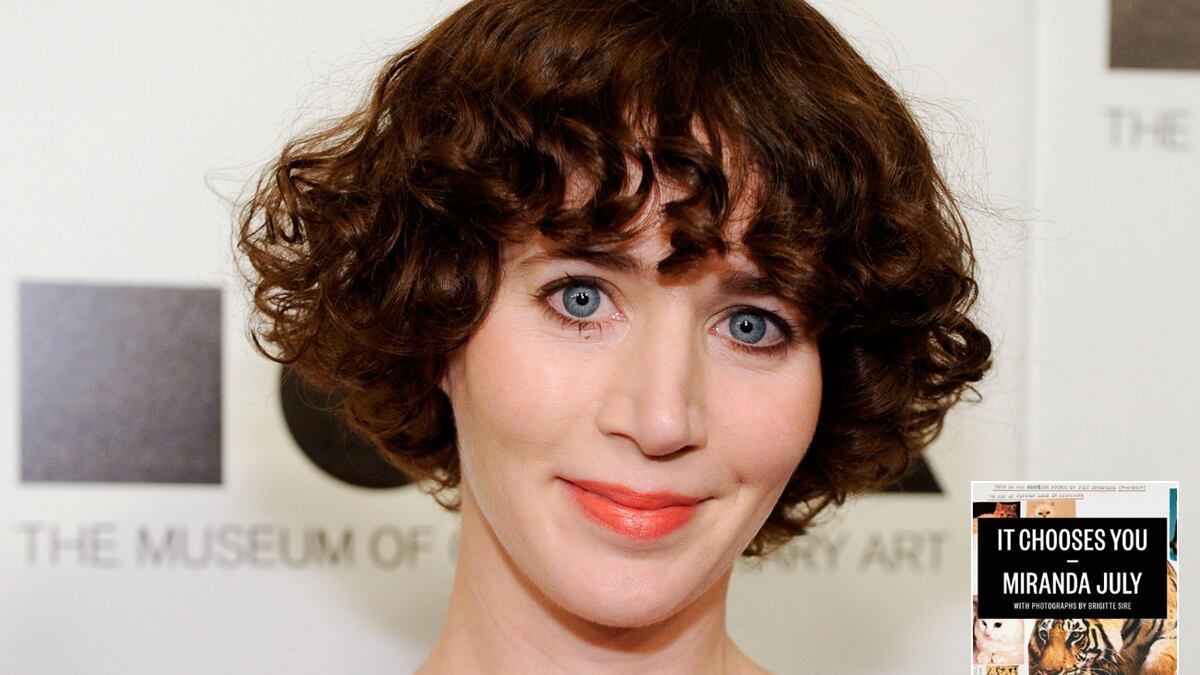In 2009, July was recently married and enshrined in her self-described “tiny house in Silver Lake” trying to finish the screenplay The Future, a story about a mid-30s couple who decide to adopt a sickly cat. She wasn’t too far from the end of her screenplay when she began contacting people from the Penny Saver to avoid writing. She decided to interview them without any firm idea of what she would do with the material. Best known for her quirky indie films Me and You and Everyone We Know (2005) and The Future (2011), July earned her literary chops from her dark and witty collection of short stories No One Belongs Here More Than You, that won her the high-flying Frank O. Connor International Short Story Award in 2007. It was her first collection of short stories.
With the interviews, she eventually made an endearing book about real people (one who ends up in her film The Future) told in her quirky and funny way with photos and transcribed bits of dialogue. Turns out, she finds an ending to her screenplay, The Future, through one of the people she encounters. July talks to The Daily Beast about how going into stranger’s homes—one who was under house arrest—is as weird as it sounds.
In your latest book, It Chooses You, you go out and interview people you’d met through the Penny Saver as a way to distract yourself while finishing your script to The Future. At what point did you realize you had a book or material for a project?A lot of projects I start feel very open-ended at the beginning, so I’m used to it. But usually I don’t write about it like I did in this book. Every project feels unreal at the beginning. So I didn’t worry about it too much. But definitely it was very unclear where I was going with this. My photographer and assistant [whom I brought on the interviews], we would have these long conversations on these long drives—what are we doing? What is this?
ADVERTISEMENT
Some of these people’s stories were quite touching. I’m wondering if there are stories that are hard to shake?Andrew, the tadpole guy, he got to me. Something about the fact that he was so young. And I remember talking to him on the phone and trying to convince him it was a good idea to have me come over. I was trying to be cool at first, because I thought because he was a 17- year-old boy he would be cool, and that would be what mattered to him. But the second I met him and saw his tadpole garden, I was like, “Oh, this kid is not any cooler than me.” And also, out of a slight paranoia because of the book being out, I keep thinking about Ron—

The guy who is under house arrest?Yeah, the house-arrest guy. He’s only one where my husband was like, “So are any of these people going to come after you?” I was like, “No.” But, when I thought about him I thought, “Too bad he’s probably not under house arrest anymore.”
Was he hitting on you? It seemed like he was in your interview.He was slightly hitting on me. But I felt like I had just encouraged him to tell me his innermost feelings and listened to him attentively for a couple hours and that was probably confusing for him. Not that I asked for it, but I suspect it felt like a rare intimacy, and he just had to make sure this wasn't romantic. My husband knew about everything as it was happening, and I think he would have been worried if I'd been doing it alone, but I had my photographer and my assistant with me always.
You seem to have your hand in every art form—performance art, film, sculpture, writing—what’s that about?I think it seems more disparate than it is. This book seems very connected with a lot of other things I’ve done that have engaged with the public or invited strangers in, in some way or other, including my website, Learning to Love You More. Or the sculptures I made for the Venice Biennale. I like to have some work that isn’t just all me. It’s different thinking up food than just thinking up stories in first person. But I think fiction, making movies, and performing are all super interrelated. I don’t think I’d know how to write fiction if I hadn’t started writing these performances and making short films. Maybe when you don’t go to school for any of this stuff and are totally self-taught, the divisions aren’t important.
I read a quote where you said you hadn’t held a day job since you were 23. What were some of the ways you had to support yourself before you could support yourself through art?That is sort of a misleading quote because it implies that I struck it big at 23. It was more like, I was really poor, and I was kind of stealing a lot. Nothing happened in particular at that point. I think I had just kind of given up. My jobs had been so awful and so badly paid that they were almost kind of negligible. And I did make a little bit of money performing. And my rent was like $175 a month in Portland [Ore.] at the time. It’s a whole different economy there. But I wrote for grants and got quite a few. I had a good run there in my 20s. Nothing glamorous, just regional arts and culture grants. I was a hard worker. It’s not like I was only stealing.
Were you a klepto? Or is that diagnosis is too extreme?I just wrote a piece about stealing that was in The New Yorker, which is maybe why it was on my mind. I wouldn't say I was a klepto, because this wasn't like a secret problem that was an aberration in an otherwise perfectly civilized life. Stealing was the least of my problems at that time.
At what point, did you think, OK, I am going to be a writer/director/actor/artist?When I was in high school. I really started, quite seriously, writing plays I put on. The first play I put on was about my correspondence with Franko [a man serving a life sentence in an Arizona prison]. That was kind of the turning point for me. It was so much more challenging than anything I’d done before. It felt like a calling, the way that nothing had before. It was grandiose enough in scale to change how I thought of my future, really.
I read that your parents run a publishing company—were they excited and supportive in you wanting to pursue this calling?I’d say they were more worried. They were more like “Miranda is not getting a good job. Or is refusing to get a job. Or living in ways that scare us.” Things going well career-wise have definitely helped our relationship in the sense that not every phone call is about how I am living.
Do you have writers that you admire and that influenced you?MJ: Yeah, Olivia Davis. This is always hard when I’m not staring at the book shelf. Amy Hempel. Lorrie Moore. Those are some.
Any other artists that you look to for inspiration?I am not a big film buff. I'm not particularly good at learning about filmmaking from watching movies. That said, the short films of Jane Campion and Richard Linklater's Slackers were two I watched in high school that made me think I could make movies. More recently, I loved Bright Star, Punch Drunk Love, and Nobody Knows. I get more direct inspiration from writers like Lydia Davis and artists, recently Clifford Owens.
You always write in the first person. Is it always a version of you?I can only think of one short story where it was at all biographical. It’s always not me.
Which short story?It was with the two girls who moved to Portland, "Something That Needs Nothing." Nothing else. Sure, I might have pulled tiny little fragments of people I know or me, but I never think of the character looking anything like me or being the same age.
Are you working on a new project now?I’m working on another book—a novel—and I’m really just at the beginning, so it will be a long time.
Do you know what your novel is going to be about?I know what it's about, but it won't do me any good to talk about it at this stage. It seems with the longer things I make—feature scripts, this novel so far—I do need a big idea, a premise that usually comes in a flash—and then I begin having ideas, not linearly, but for all different parts of the story, which I gather up for a while before I really start writing. With a script, once you have an idea for a scene you're pretty much done. It's just transcription from my mind. With fiction, the writing, the actual words alchemize everything, so the idea is just the beginning.
Your world view is quirky and weird—in the best of ways. Does it surprise you that you have a market?Yes and no. Each project, at the time, I’m pretty excited about it and thinking, wow everyone in the world should see this movie or read this book. It’s pretty naive. When it goes well, that expectation is met. In retrospect, I realize that success is so rare.
Had any of the people from your book heard of you?Just one person. I had a number of long phone conversations with people who ultimately decided not to let me interview them. There was one guy—he had cerebral palsy or something—it was incredibly hard to understand what he was saying, and he was the only one who kind of zeroed in on who I am, but I could barely understand what he was saying. At a certain point, he asked me what I did for a living, so I said I was a writer. And after a while he was like, “Wait, did you make that movie Me and You and Everyone We Know?” And I was like, of course, it’s the person whom I assumed was the most different from me who was the one who busted me. I was like completely sheepish and admitted it was me. Then he declined me.






